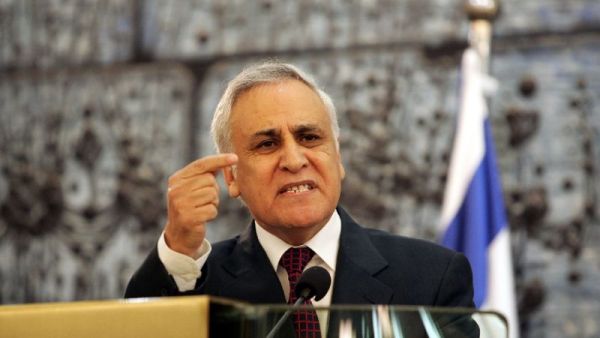For the second time this year, an Israel Prisons Service parole board on Thursday rejected a plea for the early release of former president and convicted rapist Moshe Katsav, the Israeli court system said in a tweet.
After deliberating for over two hours, the majority of the Israel Prisons parole board voted to turn down Katsav’s request.
The board ruled the 70-year-old former president will be eligible to file a new request for commutation after he completes six months of in-prison rehabilitation, Channel 10 reported.
Katsav will likely appeal the decision to the Lod District Court, reports said.
He has served five years of a seven-year sentence, and in recent months has been seeking to have his jail time reduced by one-third for good behavior.
Katsav was denied parole in April after the rehabilitation authority and state prosecutors recommended against it. At the time, the Prisoner Rehabilitation Authority told the parole board Katsav had not acknowledged or expressed remorse for his crimes, showed no empathy for his victims, and saw himself as the victim in the case, while state prosecutors noted Katsav had not participated in any rehabilitative programs offered by the prison.
Diverging from its stance on Katsav’s previous request for commutation, this time the Prisoner Rehabilitation Authority and State Attorney’s Office did not oppose the early release of the ex-president.
The Prisoner Rehabilitation Authority reversed its recommendation in July, following a meeting with Katsav. According to a report in the Yedioth Ahronoth daily, the former president agreed to a rehabilitation regimen after his release that would include religious study, regular meetings with social workers, and a commitment to not besmirch his victims.
Katsav’s lawyer Yehoshua Reznik last month would not say whether his client had assumed responsibility or expressed regret for his crimes. Reznik and Katsav’s family reportedly told him to cooperate with the demands of social workers, after Katsav insisted for years that he did not require therapy or rehabilitation.
One of Katsav’s victims had slammed the revised recommendation, suggesting political pressure was behind the new call to free the former president. If he goes free, “it would be unprecedented in Israel, and would send a very negative message, both about women and about sex offenders,” Odelia Carmon, who was assaulted by Katsav in the early 1990s, said in a July interview with Army Radio.









